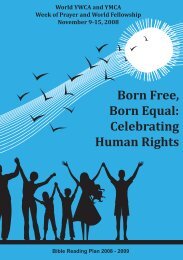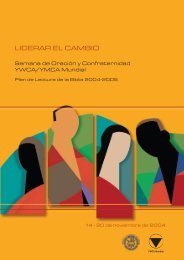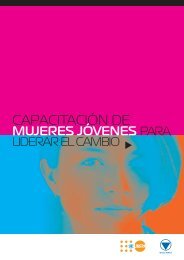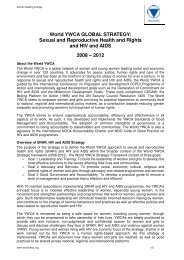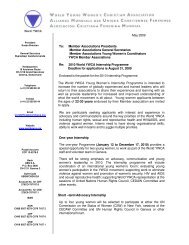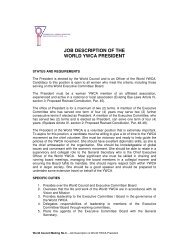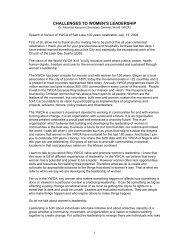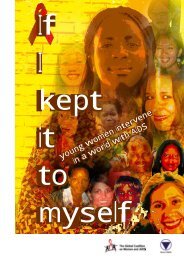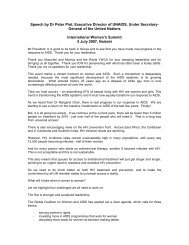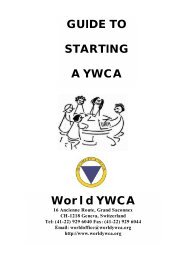World YWCA Let s talk about sex.pdf
World YWCA Let s talk about sex.pdf
World YWCA Let s talk about sex.pdf
You also want an ePaper? Increase the reach of your titles
YUMPU automatically turns print PDFs into web optimized ePapers that Google loves.
CC 11<br />
Take Action<br />
Looking through the cross<br />
at violence against women<br />
A<br />
genuinely Christian<br />
perspective is<br />
against all forms<br />
of violence against<br />
women. Christianity proclaims<br />
a God who is defined by love<br />
and who wants to be personally<br />
involved in helping women and<br />
men become whole people<br />
in societies marked by justice<br />
with peace. Violence against<br />
women works exactly against<br />
this goal. When a husband<br />
believes he can demand <strong>sex</strong><br />
from his wife; or a woman is<br />
gossiped <strong>about</strong> or shamed<br />
in the community when she<br />
reveals that her boyfriend or<br />
husband is abusing her; or a<br />
girl is deprived an education<br />
in favor of a boy; or a woman<br />
is denied in a thousand large<br />
and small ways the possibility<br />
of developing her full potential<br />
and personhood—it is violence<br />
against the dignity of women.<br />
When any of these actions are linked somehow with God,<br />
they can be even more devastating.<br />
In the first pages of the Bible we see God created men<br />
and women both in God’s image with inherent value and<br />
with the capacity to create, reason and love (1). Jesus treated<br />
women with kindness and respect. In a context where<br />
women were not valued as highly as men and did not have<br />
the same rights as men, Jesus<br />
defended women, healed women,<br />
and developed friendships with<br />
women, even women outcast in<br />
their society (2). At a time when<br />
a woman’s testimony was not<br />
considered valid, Jesus chose to<br />
appear first to women after his<br />
resurrection (3).<br />
Thinking theologically <strong>about</strong><br />
the real issues of life allows<br />
us to ask and articulate how<br />
faith can make a difference. It<br />
allows us to ask questions <strong>about</strong><br />
interpretations of the Bible that<br />
seem to limit women. It allows<br />
us to find new ways of relating<br />
the biblical texts to our current<br />
experiences and needs.<br />
One strong example of a<br />
new reading and application<br />
of a familiar text is the Tamar<br />
Campaign, whose aim is<br />
to mobilise and sensitise<br />
girls, women, men, media,<br />
faith organisations, religious<br />
institutions and others to say no to rape and domestic<br />
violence. It is centered around a Bible study of the story of<br />
Tamar in 2 Samuel 13:1-22. Tamar, David’s daugther, was<br />
raped by Ammon, her half brother. A symbol of violence<br />
against women, Tamar was not only abused but also<br />
courageously spoke out against her abuse. Her powerful act<br />
can encourage other women to speak out against abuse.<br />
Rape and <strong>sex</strong>ual assault are widely recognised as crimes, although in 44 countries<br />
legislation is yet to be developed (UNIFEM 2003 Report)<br />
www.worldywca.org




